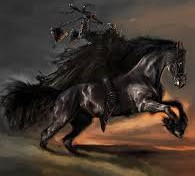I'm currently getting my masters, and I'm taking a historiography class. This is an exchange between me and my professor on a discussion board. You people are usually pretty good at destroying each other's weak ass arguments (usually in an entertaining way). Does what I wrote make sense? Or is this just incoherent ramblings?
Professor
"I think you've raised some interesting ideas here. One thing I would argue, though, is that the interests of the elites, rather than the power of the state, shaped historical topics. For much of the time we've studied, elites have been involved in politics, war and diplomacy. Therefore, those that were interested in history would want to read histories on those subjects, and those who wrote histories probably had an interest in those subjects. Of course, those topics are still studied by historians- including myself, and I'm hardly a social elite. Why do you think this is?"
My Response
"Professor, I would argue that the interests of an elite and the interests of the state that the elite control are the same. This is because the state is a tool that the elites can use to perform their will. It seems to be the case that every large complex society since since the neolithic revolution has had an elite and a state. The two are inseparable. The more numerous or complex the society, the more powerful the state. Even Communist societies that were explicitly created to be classless still had an elite, and a large powerful state. Those Dachas on the black sea were not given out in a lottery, powerful members of the Communist party would get them. Elites seem to be an inevitable result of large complex human societies, and states seem to be an inevitable result of elites. So if the elites of large complex societies write history, why is the history in our society explored by mostly middle class academics? I would argue this is a result of Industrialization. Industrial societies require higher levels of literacy and cognition to function. Post industrial societies that focus on the development of technology, like the US, require even more literacy and cognition to function. Historically, being able to read and explore ideas are not attributes required by most societies for most of their population. If Newton was born in the Ukraine in a peasant village in 1000 AD, he would not have developed Calculus. He probably would never even learn to read. The brainpower of the elites was enough to sustain preindustrial agrarian societies. This is not the case now. Our society requires tremendous amounts of brainpower to even function. Elites of Industrial (and Post Industrial) societies use the power of the state to cultivate brainpower. They do not do this out of sympathy or altruism, but because it is currently necessary for their societies to function. A direct result of this cultivation of brainpower is that non-elites now have the mental tools to function as historians, if they have the passion.
Ps - I have never thought of the relationship of elites and the state in this model before. I think it is important to define the term elites as I am using it in the above paragraph. Elites are the people that control the state. They could be the most wealthy of a society, or they could be the warrior class, or they could be bureaucrats and politicians, as in our society."
Does this make sense?
-
Speaker to Animals

- Posts: 38685
- Joined: Wed Nov 30, 2016 5:59 pm
Re: Does this make sense?
I think your professor is correct.
The state is more like a glove and it is worn by different hands. It looks like the same thing, but what it does depends upon who is wearing (wielding) it at any given time.
How the state operates depends upon the competing interests of the elites of that society. They have their own interests and their own games which are often in conflict with the best interest of the sate and the people. It's always like this.
E.g. the Sicilian campaign in which Athenian elites bankrupted the state on a crackpot plan to gain control of a significant portion of the Med's grain supply.
E.g. Bush's invasion of Iraq and Obama's creation of ISIS. We didn't vote on those things. In fact, both of those guys were elected on platforms that rejected such endeavors. Neither endeavor did a bit of good for our state, but they did a lot of financial good for the backers of those two presidents.
The state is more like a glove and it is worn by different hands. It looks like the same thing, but what it does depends upon who is wearing (wielding) it at any given time.
How the state operates depends upon the competing interests of the elites of that society. They have their own interests and their own games which are often in conflict with the best interest of the sate and the people. It's always like this.
E.g. the Sicilian campaign in which Athenian elites bankrupted the state on a crackpot plan to gain control of a significant portion of the Med's grain supply.
E.g. Bush's invasion of Iraq and Obama's creation of ISIS. We didn't vote on those things. In fact, both of those guys were elected on platforms that rejected such endeavors. Neither endeavor did a bit of good for our state, but they did a lot of financial good for the backers of those two presidents.
-
Okeefenokee

- Posts: 12950
- Joined: Wed Nov 30, 2016 10:27 pm
- Location: The Great Place
Re: Does this make sense?
Where's the math?
GrumpyCatFace wrote:Dumb slut partied too hard and woke up in a weird house. Ran out the door, weeping for her failed life choices, concerned townsfolk notes her appearance and alerted the fuzz.
viewtopic.php?p=60751#p60751
-
TheReal_ND

- Posts: 26048
- Joined: Wed Nov 30, 2016 6:23 pm
Re: Does this make sense?
Ask him if he's noticed the media, foreign policy, and banking interests tend to favor a specific people. He seems woke."I think you've raised some interesting ideas here. One thing I would argue, though, is that the interests of the elites, rather than the power of the state, shaped historical topics. For much of the time we've studied, elites have been involved in politics, war and diplomacy. Therefore, those that were interested in history would want to read histories on those subjects, and those who wrote histories probably had an interest in those subjects. Of course, those topics are still studied by historians- including myself, and I'm hardly a social elite. Why do you think this is?"
Oh and those same specific peoples are holding every board including his tenure.
-
Speaker to Animals

- Posts: 38685
- Joined: Wed Nov 30, 2016 5:59 pm
Re: Does this make sense?
Nukedog wrote:Ask him if he's noticed the media, foreign policy, and banking interests tend to favor a specific people. He seems woke."I think you've raised some interesting ideas here. One thing I would argue, though, is that the interests of the elites, rather than the power of the state, shaped historical topics. For much of the time we've studied, elites have been involved in politics, war and diplomacy. Therefore, those that were interested in history would want to read histories on those subjects, and those who wrote histories probably had an interest in those subjects. Of course, those topics are still studied by historians- including myself, and I'm hardly a social elite. Why do you think this is?"
Oh and those same specific peoples are holding every board including his tenure.
Hindus?
-
TheReal_ND

- Posts: 26048
- Joined: Wed Nov 30, 2016 6:23 pm
Re: Does this make sense?
Elaborate while I log the fuck off
-
SuburbanFarmer

- Posts: 25488
- Joined: Wed Nov 30, 2016 6:50 am
- Location: Ohio
Re: Does this make sense?
I agree with StA, your prof has you on this. The elites can certainly study history, if they choose to, but it's no requirement of being an elite - or of writing history.Sparrow941 wrote:I'm currently getting my masters, and I'm taking a historiography class. This is an exchange between me and my professor on a discussion board. You people are usually pretty good at destroying each other's weak ass arguments (usually in an entertaining way). Does what I wrote make sense? Or is this just incoherent ramblings?
Professor
"I think you've raised some interesting ideas here. One thing I would argue, though, is that the interests of the elites, rather than the power of the state, shaped historical topics. For much of the time we've studied, elites have been involved in politics, war and diplomacy. Therefore, those that were interested in history would want to read histories on those subjects, and those who wrote histories probably had an interest in those subjects. Of course, those topics are still studied by historians- including myself, and I'm hardly a social elite. Why do you think this is?"
My Response
"Professor, I would argue that the interests of an elite and the interests of the state that the elite control are the same. This is because the state is a tool that the elites can use to perform their will. It seems to be the case that every large complex society since since the neolithic revolution has had an elite and a state. The two are inseparable. The more numerous or complex the society, the more powerful the state. Even Communist societies that were explicitly created to be classless still had an elite, and a large powerful state. Those Dachas on the black sea were not given out in a lottery, powerful members of the Communist party would get them. Elites seem to be an inevitable result of large complex human societies, and states seem to be an inevitable result of elites. So if the elites of large complex societies write history, why is the history in our society explored by mostly middle class academics? I would argue this is a result of Industrialization. Industrial societies require higher levels of literacy and cognition to function. Post industrial societies that focus on the development of technology, like the US, require even more literacy and cognition to function. Historically, being able to read and explore ideas are not attributes required by most societies for most of their population. If Newton was born in the Ukraine in a peasant village in 1000 AD, he would not have developed Calculus. He probably would never even learn to read. The brainpower of the elites was enough to sustain preindustrial agrarian societies. This is not the case now. Our society requires tremendous amounts of brainpower to even function. Elites of Industrial (and Post Industrial) societies use the power of the state to cultivate brainpower. They do not do this out of sympathy or altruism, but because it is currently necessary for their societies to function. A direct result of this cultivation of brainpower is that non-elites now have the mental tools to function as historians, if they have the passion.
Ps - I have never thought of the relationship of elites and the state in this model before. I think it is important to define the term elites as I am using it in the above paragraph. Elites are the people that control the state. They could be the most wealthy of a society, or they could be the warrior class, or they could be bureaucrats and politicians, as in our society."
Your response is correct, up until you get into the question about why the middle class mostly studies history. An elite education will certainly include a deep understanding of history, but again, that is not a requirement to be an elite. We are a plutocracy - our elites are determined by financial wealth, not knowledge, or merit.
Also, the education inflation of modern society is immense. Even the most inept fry cook has what would have been an elite education, just a few hundred years ago. The mere ability to read and perform basic math would have been an upper-class pursuit in the early 19th. That does not necessarily equate to deep or critical thinking, and everyone is not now a grand philosopher (or even above the level of idiocy). The non-elites certainly have the "tools" to pursue deeper knowledge, but the masses are, as ever, blissfully ignorant of anything beyond Right Now.
I'm not sure what the larger debate was about... But he's got the upper hand, from this excerpt.
-
Alexander PhiAlipson

- Posts: 1411
- Joined: Thu Jan 05, 2017 2:29 pm
Re: Does this make sense?
You didn't answer his question. You should have answered his question. Or at least turned it on yourself.
"She had yellow hair and she walked funny and she made a noise like... O my God, please don't kill me! "
-
Okeefenokee

- Posts: 12950
- Joined: Wed Nov 30, 2016 10:27 pm
- Location: The Great Place
Re: Does this make sense?
Globalism pretty much puts to rest the idea of elites being in line with the best interests of their nations. You'd have been right centuries ago, though.
GrumpyCatFace wrote:Dumb slut partied too hard and woke up in a weird house. Ran out the door, weeping for her failed life choices, concerned townsfolk notes her appearance and alerted the fuzz.
viewtopic.php?p=60751#p60751
-
I just Lurk

- Posts: 118
- Joined: Thu Dec 01, 2016 7:03 am
Re: Does this make sense?
Yes, elites are human beings and therefore usually act shortsighted. And they don’t give a fuck about the society that they preside over (thanks dunbar’s number). That much is clear just from looking around. What I’m getting at in my post is that having a bunch a people capable of higher thinking is both necessary for our technological society to operate, and bad for the elites. It’s much easier to control illiterate peasants. But then you can’t have cars and guns and shiet. Being in control of a society that can produce and design our modern world is more complicated than being in control of previous societies.Speaker to Animals wrote:I think your professor is correct.
The state is more like a glove and it is worn by different hands. It looks like the same thing, but what it does depends upon who is wearing (wielding) it at any given time.
How the state operates depends upon the competing interests of the elites of that society. They have their own interests and their own games which are often in conflict with the best interest of the sate and the people. It's always like this.
E.g. the Sicilian campaign in which Athenian elites bankrupted the state on a crackpot plan to gain control of a significant portion of the Med's grain supply.
E.g. Bush's invasion of Iraq and Obama's creation of ISIS. We didn't vote on those things. In fact, both of those guys were elected on platforms that rejected such endeavors. Neither endeavor did a bit of good for our state, but they did a lot of financial good for the backers of those two presidents.
I was trying to answer the question
“Why are most historical sources about political dealings, diplomacy and military engagements.?”
My answer was fancy talk that basically said “cuz the leisure class was the only class that could read, and write and they also controlled the state. Therefore dealings of the state were important to them. People write about what is important to them.”
“But I’m not part of the leisure class, and I’m a historian. What about that Mr. Student?”
“Cuz our society needs people that use their brains to operate, and a byproduct of that is that regular people now have the tools (critical thinking, time to read shit) to be a historian”
Then I posted it here.
NukeDog was right